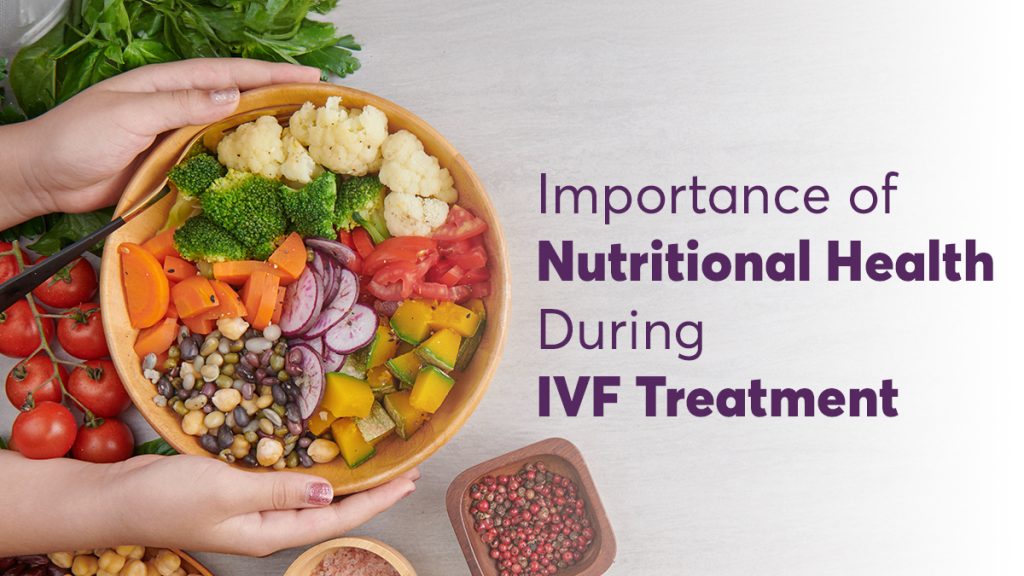Are you considering in vitro fertilization (IVF) to get pregnant? Nutrition is critical to preparing well for the success of the procedure. Here’s what you should know about the nutritional requirements for IVF procedures.
The Basics of Nutrition in IVF
Maintaining a healthy diet improves sperm and egg quality, while facilitating fertilization and embryo and fetal development. Key nutrients to consider for IVF are:
Women
- Folic Acid: Facilitates fetal development and prevents birth defects.
- Zinc: Enhances DNA development in the fetus.
- Calcium: Improves breast milk quality and prevents preterm birth and pre-eclampsia (high BP during pregnancy).
- Iron: Enhances the health of the placenta.
Men and Women
- Protein: Facilitates tissue and muscle repair for the baby and the carrier and improves sperm quality.
- Omega-3 Fatty Acids: Balance reproductive hormones and support uterine lining and brain development.
Nutritional Recommendations for IVF
A balanced diet before and during IVF is critical. Start by balancing macronutrients and then ensure micronutrient intake. Include:
- Complex Carbohydrates
- Whole grains and sweet fruits.
- Healthy Fats: Avocados, nuts, seeds, olive oil, coconut oil.
- Proteins: Lean meat, fish, dairy, legumes.
Micronutrients
- Folic Acid: Leafy greens, and citrus fruits
- Zinc: Oysters, pumpkin seeds, and whole grains
- Calcium: milk, cheese and other dairy products
- Vitamin D: Fatty fish, fortified dairy, and eggs
- Iron: Spinach, kale, beans
- Omega-3 Fatty Acids: Salmon, mackerel, chia seeds, flax seeds, walnuts
- Water: High-water fruits and vegetables, 8 glasses of water
- Antioxidants: Berries, colorful vegetables
What to Eat and When to Eat It
In today’s busy life, balancing diet and work can be tricky. The best way to proceed is to get a nutrition consultation for a targeted diet for IVF. If your healthcare practitioner approves self-management, try to have balanced meals and low-sugar snacks. The below guide can be helpful.
Include Fertility Boosting Foods
Naturally boost fertility with antioxidant-rich foods, omega-3-rich foods, fibre, and lean protein sources. Walnuts, tomatoes, citrus fruits, full-fat dairy, beans, lentils, sardines and salmon improve fertility naturally.
Choose Organic Foods
Organic produce is free of insecticides, herbicides and pesticides, which are known to have endocrine disruptors that interfere with reproductive hormones and lower fertility. Also, eat fruits and vegetables after thoroughly washing them.
Supplements
Supplements are important to add some extra nutritional requirements to increase the chances of a successful IVF procedure. Ensure that you take supplements only under medical guidance.
Foods to Avoid
- Alcohol: Alcohol may cause premature ejaculation in males and prevent embryo formation in females.
- Processed Foods: Sugar-loaded beverages and fast-food have high trans-fat content and low nutritional value, which affects fertility.
Foods to Eat Before Embryo Transfer
Both the male and female partner should focus on antioxidant-rich foods to reduce oxidative stress in the body and create a healthy reproductive environment for the egg, sperms and embryo.
What to Eat After Embryo Transfer
Iron and omega-3 fatty acids facilitate implantation and placenta formation. Include these after embryo transfer.
Lifestyle and Nutritional Health
While a good diet is crucial during IVF, do not ignore other factors. You and your partner must maintain a healthy body weight to improve physical and reproductive health. Try exercises to strengthen pelvic muscles and remove fatty tissue from the reproductive organs, such as:
Low-intensity movement
- Weight loss exercises if you are overweight – weight training and yoga.
- Pelvic exercises/yoga to strengthen the muscles – Kegel’s deep squats, pelvic holds, baby pose and diagrammatic breathing.
- Activities that help you maintain your mental health and lower stress levels, such as listening to music, going out in nature, practicing your creative skills.
Additionally, you must consistently monitor your nutritional health through self-monitoring techniques or blood tests. Your healthcare practitioner may guide you on the crucial factors to monitor, based on your specific infertility concerns. You don’t have to do anything alone, work with a nutritional practitioner to guide you with the changing dietary requirements through the IVF procedure.
To Sum it Up
Good nutrition is essential for the success of the IVF procedure. However, more than nutrition, tiny lifestyle changes can significantly impact the reproductive health of both partners and improve the chances of success. Seek guidance from your fertility professional for adequately planning the diet for IVF, exercise routine, and monitoring needs. Maintain consistency by including the necessary foods to eat before and after embryo transfer. Most importantly, understand that infertility can happen to anyone and that you are not alone in your journey to build your family.

